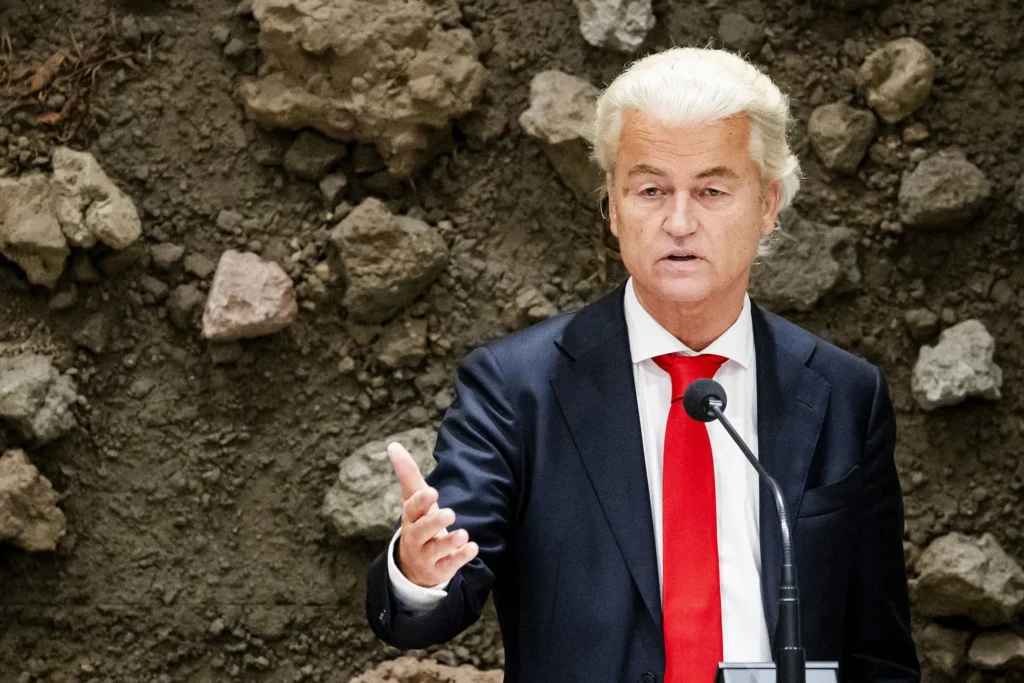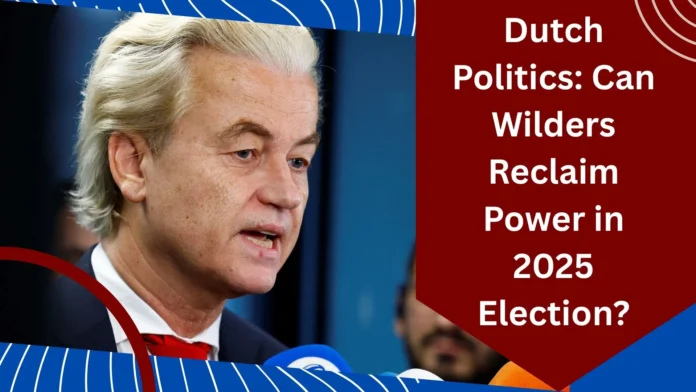Introduction
In the heart of Dutch politics, a storm is brewing. Geert Wilders, the polarizing leader of the far-right Freedom Party (PVV), has once again shaken the Netherlands’ political landscape by pulling his party out of a fragile coalition government in June 2025, just 11 months after its formation. The collapse, triggered by irreconcilable differences over immigration policy, has thrust the country into a fresh wave of uncertainty as it heads toward a snap election expected in September 2025. Polls indicate that Wilders’ PVV, the center-right People’s Party for Freedom and Democracy (VVD), and the Green-Labour alliance (GL/PvdA) are in a close battle. Will the Netherlands return to its centrist foundations, or can Wilders regain his lead?
Why Did the Dutch Coalition Collapse?
The collapse of the Dutch coalition government in June 2025 was a dramatic turn, even by the standards of the Netherlands’ famously fragmented political system. One of the most right-wing coalitions in Dutch history, it included the Farmer-Citizen Movement (BBB), the New Social Contract (NSC), the VVD, and Wilders’ PVV.
Formed after the PVV’s surprising victory in the November 2023 general election, where it secured 37 seats, the coalition was a delicate balancing act from the start. Wilders, known for his anti-Islam rhetoric and hardline stance on immigration, was barred from the premiership by his coalition partners, who opted instead for Dick Schoof, a former intelligence chief with no political affiliation, to lead as prime minister.
The coalition’s downfall hinged on immigration policy—a perennial flashpoint in Dutch politics. Wilders proposed a radical 10-point plan that included deploying the army to patrol borders, closing refugee centers, and deporting Syrian refugees, claiming the country was safe for their return. These proposals, widely criticized as breaching European human rights laws and the UN Refugee Convention, were rejected by the VVD, NSC, and BBB. Frustrated, Wilders pulled his ministers out, accusing his partners of betraying the “strictest asylum policy” he had campaigned for. As Dilan Yeşilgöz, the VVD leader, put it, “He’s running away, at a time of unprecedented uncertainty,” citing global challenges like the war in Ukraine and looming economic concerns.
Wilders’ Gamble: A Pattern of Disruption
Wilders’ decision to abandon the coalition was a calculated risk, consistent with his 20-year career as Dutch politics’ provocateur-in-chief. By collapsing the government, he aims to recenter immigration as the defining issue of the upcoming election, rallying his base with promises to “put the Dutch first.” Political scientist Sarah de Lange of the University of Amsterdam described it as a “trademark political gamble,” noting that Wilders thrives on chaos to position himself as the authentic voice of the far right.
But this move may backfire. His coalition partners, including the BBB’s Mona Keijzer, accused him of prioritizing his ego over the country’s stability, with Keijzer stating, “He is not putting the Netherlands first, he is putting Geert Wilders first.”
Who Are the Key Players in Dutch Politics?
The Dutch political landscape is a kaleidoscope of parties, with 15 currently holding seats in the 150-seat House of Representatives. The election in September 2025 appears to be a three-way contest between Frans Timmermans’ Green-Labour alliance, Dilan Yeşilgöz’s VVD, and Wilders’ PVV. A closer look at the main candidates is provided below:
Geert Wilders and the Freedom Party (PVV)
Geert Wilders, a polarizing figure with a shock of platinum-blonde hair, has been a fixture in Dutch politics since leaving the VVD in 2004 to form the PVV. His platform, built on anti-immigration and anti-Islam rhetoric, has resonated with voters frustrated by the Netherlands’ housing shortages and strained asylum system. In 2023, the PVV’s 37 seats marked a historic upset, described as “one of the biggest political shifts in Dutch politics since World War II.”
However, according to recent polls, the PVV is losing ground to the VVD and GL/PvdA, which are about deadlocked at 20% support. Wilders’ challenge is clear: his radical policies make coalition-building difficult, as other parties remain wary of his volatility and legal controversies, including a 2016 conviction for discrimination.
Dilan Yeşilgöz and the VVD
The VVD, a center-right party that dominated Dutch politics under Mark Rutte for over a decade, is now led by Dilan Yeşilgöz, a charismatic daughter of Turkish refugees. Polling between 25-31 seats, the VVD is positioned as a kingmaker, capable of aligning with either the center-left or far-right. Yeşilgöz’s decision in 2023 to entertain a coalition with Wilders boosted his legitimacy but cost her party votes, as some saw it as a betrayal of the VVD’s liberal roots.
Critics argue she underestimated Wilders’ unpredictability. As one VVD insider noted, “She left the door wide open for Wilders, and now he’s blown it.” Yeşilgöz now emphasizes stability and security, aiming to restore the VVD’s reputation as a reliable governing force.
Frans Timmermans and the Green-Labour Alliance
The center-left Labour Party (PvdA) and the environmentally conscious GroenLinks form the GL/PvdA coalition, which is headed by former EU climate commissioner Frans Timmermans. The coalition, which is polling at 25–29 seats, appeals to those who value social justice, multiculturalism, and climate action. Timmermans, a seasoned diplomat, has positioned the alliance as a counterweight to the far-right, vowing never to join a coalition with the PVV. In cities like Amsterdam and Utrecht, the alliance enjoys strong support, with 2023 results showing 15.56% of the vote and 25 seats. However, right-wing voters view Timmermans with skepticism, associating him with EU bureaucracy.
Other Players: NSC, BBB, and the Christian Democrats
The NSC, founded by Pieter Omtzigt, and the BBB, led by Caroline van der Plas, were key players in the 2023 coalition but are now polling poorly, with projections suggesting near wipeouts in September 2025. The Christian Democratic Appeal (CDA), recovering from defections to the NSC, is polling at 16-20 seats, signaling a potential resurgence. These smaller parties could play a pivotal role in coalition negotiations, as no single party is likely to secure the 76 seats needed for a majority.
What Do Recent Polls Say About the September 2025 Election?
Recent polls paint a picture of a deadlocked race. According to a POLITICO Poll of Polls from April 2025, the PVV, VVD, and GL/PvdA are neck-and-neck, each hovering around 20-25% of the vote. The PVV’s support has waned since its 2023 peak, reflecting voter fatigue with Wilders’ divisive tactics. The VVD and GL/PvdA, meanwhile, are capitalizing on calls for stability amid global uncertainties, including the war in Ukraine and economic challenges. The resurgent CDA, with 16-20 seats, could tip the scales in coalition talks.
Deniz Horzum, a former Dutch official, predicts a “political duopoly” between the VVD and GL/PvdA, framing the election as a choice between centrism and extremism. “Expect VVD and Labour/GreenLeft to turn this into a vote for me or you get the crazies on the other side,” he said. This dynamic could marginalize Wilders, whose coalition prospects are dimming as parties recoil from his recent betrayal.
Why Immigration Remains the Defining Issue
Immigration has long been a lightning rod in Dutch politics, and the September 2025 election will be no exception. The Netherlands, one of the world’s most densely populated countries, has struggled to manage refugee inflows, with reception centers overflowing and a housing crisis exacerbating tensions. Wilders’ 10-point plan, while appealing to his base, has been widely criticized as unfeasible and illegal. Proposals like banning family reunification for refugees and deporting Syrians clash with EU and international law, making coalition partners hesitant to align with him. The VVD, while advocating for stricter migration controls, emphasizes legal and pragmatic solutions, while the GL/PvdA pushes for humane policies that balance integration with humanitarian obligations.
Can Wilders Become Prime Minister?

Wilders’ ambition to become prime minister remains a long shot. His 2023 victory, which saw the PVV win 37 seats, was a high-water mark, but coalition partners refused to let him lead, citing his polarizing rhetoric and legal issues. The collapse of the 2025 coalition has further eroded his credibility, with even former allies like the BBB and NSC distancing themselves. Political analyst Tom van der Meer of the University of Amsterdam noted, “Wilders’ move to collapse the government reinforces his image as a renegade, not a leader. He’s heading for opposition.”
To form a government, Wilders would need at least two major partners to reach the 76-seat threshold. The VVD, burned by the recent collapse, is unlikely to trust him again, while the GL/PvdA and CDA have ruled out cooperation. Smaller parties like the BBB and NSC, projected to lose significant ground, lack the seats to make a difference. Wilders’ only path may be to double down on his anti-immigration platform and hope for another electoral surge, but polls suggest voters are tiring of his tactics.
What Will the 2025 Election Mean for the Netherlands and EU?
The outcome of the September 2025 election will have far-reaching implications for the Netherlands and its role in the EU. A VVD-led coalition, likely with the CDA and possibly D66 or smaller parties, would restore the Netherlands’ reputation as a stable, pro-EU force. A GL/PvdA-led government, potentially with the CDA and D66, would prioritize climate action and social equity, aligning closely with Brussels’ green agenda. Either scenario would mark a return to centrism, reversing the populist wave that saw the BBB dominate regional elections in 2022 and the PVV triumph in 2023.
A Wilders-led resurgence, though unlikely, would shift the Netherlands toward Euroskepticism, with the PVV advocating for a “Nexit” and reduced EU cooperation. With the 2026 elections for the European Parliament approaching, such a change might give far-right movements more confidence throughout Europe. However, the Netherlands’ history of coalition governance and its fragmented parliament make a far-right government improbable without significant concessions from Wilders—concessions he has historically been unwilling to make.
Conclusion: A Crossroads for Dutch Politics
Dutch politics stands at a crossroads. Once a powerful force, Geert Wilders’ Freedom Party is fighting to rebuild confidence after the coalition government fell apart. The VVD and GL/PvdA, polling neck-and-neck, offer voters a choice between centrist stability and progressive reform. With immigration, security, and economic challenges dominating the discourse, the September 2025 election will test the Netherlands’ appetite for populism versus pragmatism. As the campaign heats up, one thing is clear: the outcome will not only shape the Netherlands but also send ripples across the EU. Stay tuned as we continue to cover this pivotal moment in Dutch politics.


